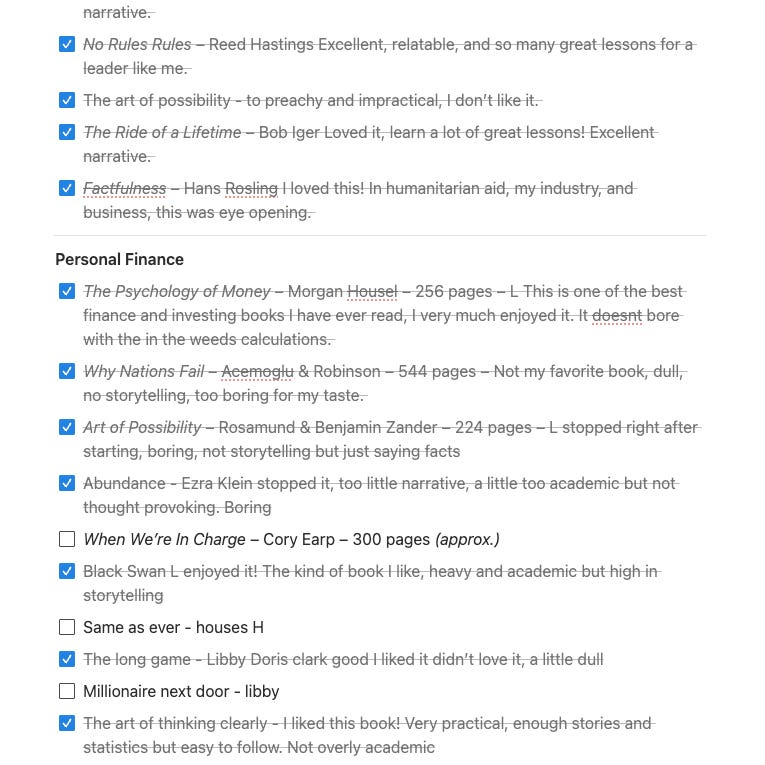Stop Wasting Time on Bad Book Recommendations
How to finally get recommendations that fit your actual needs
Thanks for reading! To access our community, full prompt library, coaching, and AI tools saving leaders 5-10 hours per week, check out our Premium Hub.
Look at your bookshelf right now. How many books are sitting there half-read or maybe even never opened? Books you bought because someone said they were essential. Books that came highly recommended but never quite captured your interest. Books that might be brilliant for someone else’s journey but do nothing for yours.
That shelf isn’t a failure. It’s proof that generic recommendations don’t work.
I read consistently. Two non-fiction books, one fiction. Not because I’m trying to hit a number, but because in a world changing faster than we can track, staying sharp isn’t optional.
What truly helped me was that I stopped trusting recommendations designed for someone else. I started tracking every book I read and why I loved or hated it.
Because the gap between leaders who thrive and those who fall behind often comes down to one thing: how deliberately they learn. And that starts with reading the right books.
I then took all of this information and built an AI-powered tool for all readers that analyzes the books you didn’t like, books you loved, and combines that knowledge to generate 10 personalized recommendations. More on that later.
In this article, you’ll discover:
Why intentional learning is the most fundamental leadership skill you can develop right now
The reading system I use to stay sharp without burning out (and why the combination of non-fiction and fiction matters)
What McKinsey’s research reveals about effective learners and how reading fits into that framework
How tracking your reading preferences transforms what you get out of every book
A free AI-powered tool that analyzes your actual taste and recommends books built for your specific leadership journey
The Problem with Generic Book Lists
I got tired of YouTube videos promising “10 Books That Will Change Your Life.” The comments would be glowing. The thumbnails looked promising. But when I actually read the books, most of them did nothing for me.
The breaking point came when I realized I was reading books other people loved that just didn’t fit what I actually liked.
Someone would rave about a business book, so I’d buy it. Halfway through, I’d realize it was too academic, or too surface-level, or addressing problems I didn’t have. I wasn’t learning. I was performing the act of reading because someone told me I should.
That’s when I started keeping a closer track. Every book I finish gets logged with a simple note: what I loved about it or why it didn’t work. Over time, patterns emerged. I could see what actually moved me forward versus what just took up space on my shelf.
Brought to you by COZORA👇. Get up to 50% off with the coupon in the Premium Hub.
Why Intentional Learning Matters More Than Ever
I keep coming back to something McKinsey discovered in their research on learning. They found that learning itself matters more than any specific skill you could master. More than your technical expertise, more than your industry knowledge, the ability to learn beats everything else.
Learning itself is a skill, and developing it is a critical driver of long-term career success. People who have mastered the mindsets and skills of effective learning can grow faster than their peers. - McKinsey
Think about where we are right now. The World Economic Forum calls it a “reskilling emergency.” More than one billion jobs are being transformed by technology. The professional landscape you understood five years ago doesn’t exist anymore. The strategies that worked last year might be obsolete by next quarter.
The catch most people miss: we were never taught how to learn effectively. We were taught what to learn, but not how. We consume content without strategy. We read because we’re supposed to, not because we’re building something.
That has to change.
My Reading System: Two Non-Fiction, One Fiction
At any given time, I’m reading two non-fiction books and listening to one fiction book.
The two non-fiction books serve different purposes. One is usually directly applicable to a challenge I’m facing right now. A leadership framework I’m working through. A strategy I’m trying to understand. The other is broader, something that expands my thinking in an adjacent area. Right now, those might be a book on organizational change and another on AI development.
Books I’ve loved in non-fiction recently include Factfulness by Hans Rosling, which completely shifted how I think about global progress and data, and The Tipping Point by Malcolm Gladwell.
Each of these books didn’t just give me information. They changed how I see the world.
Fiction serves a different but equally important role. It’s not just entertainment. Fiction builds empathy, expands imagination, and helps me think through complex human dynamics without the pressure of immediate application.
I loved Theft of Swords by Michael J. Sullivan. Two guys, one of them an elf, navigating impossible situations through trust and complementary skills. I’m currently reading The Name of the Wind by Patrick Rothfuss, and the way he builds a character’s journey from nothing to mastery mirrors so much of what I see in learning in our journey.
McKinsey studied thousands of professionals to understand what separates fast learners from everyone else. They identified two critical mindsets and five core practices that make the difference.
The two mindsets:
A growth mindset - the belief that you can develop, change, and improve rather than being fixed in your capabilities
Active curiosity - treating every moment as a learning opportunity
Reading becomes dramatically more valuable when you do it with intention. Not reading for the sake of reading. Reading to build something specific.
How I Finally Stopped Book Overwhelm
Everything shifted when I started tracking every book I read. Not just titles, but why I loved or hated them. What worked. What didn’t. Over time, I could see clear patterns:
I love books with narrative and storytelling, not just facts and frameworks
I prefer books that are academic enough for credibility but written in language anyone can understand
I get bored with books that are too philosophical without practical application
In fiction, I’m drawn to character-driven stories with deep relationships and growth arcs
So I built something different, an AI-powered tool for all readers that analyzes the books you didn’t like, books you loved, and combines that knowledge to generate 10 personalized recommendations. See it in action…
I created an AI-powered book recommendation tool that does something most recommendation engines don’t: it learns from what you actually love and what you actually hate.
This tool is part of the Leadership in Change Premium Member Hub, where I’ve built an entire arsenal of AI-powered leadership tools. But for a limited time, I’m making this specific tool available to all readers of this article.
Because if there’s one thing I want you to walk away with, it’s this: there are better ways to find books that actually matter for your journey.
Access the tool! 👇
Why This Matters for Leaders Right Now
Most leadership advice tells you to read more. I’m telling you to read less.
Read fewer books, but read the right ones. One book that transforms how you think beats ten books you force yourself through. Quality over quantity isn’t a cliché. It’s the only strategy that works.
We’re living in an age of rapid transformation. AI is rewriting entire industries. Remote work changed how we lead teams. The skills that got you here won’t get you where you’re going.
Leaders who succeed in this environment share one trait: they’re relentless, intentional learners.
PS: Many subscribers get their Premium membership reimbursed through their company’s professional development $. Use this template to request yours.
Let’s Connect
I love connecting with people. Please use the following connect, collaborate, if you have an idea, or just want to engage further:
LinkedIn / Community Chat / Email / Medium






Totally agree on being deliberate.
Working on your leadership intentionally also means being honest about where you’re weak.
The best leaders I’ve interviewed preferred fiction, biographies, and real human stories to spark ideas for their own journeys.
I wrote a post recently on this too: https://millennialmasters.net/p/reading-stories-not-advice
I might steal the 2 non-fiction one-fiction formula from you Joel. Funny thing is I eschewed fiction for most of my life until fairly recently, but now I'm writing about technology and innovation using some fiction and a lot of narrative emphasis.